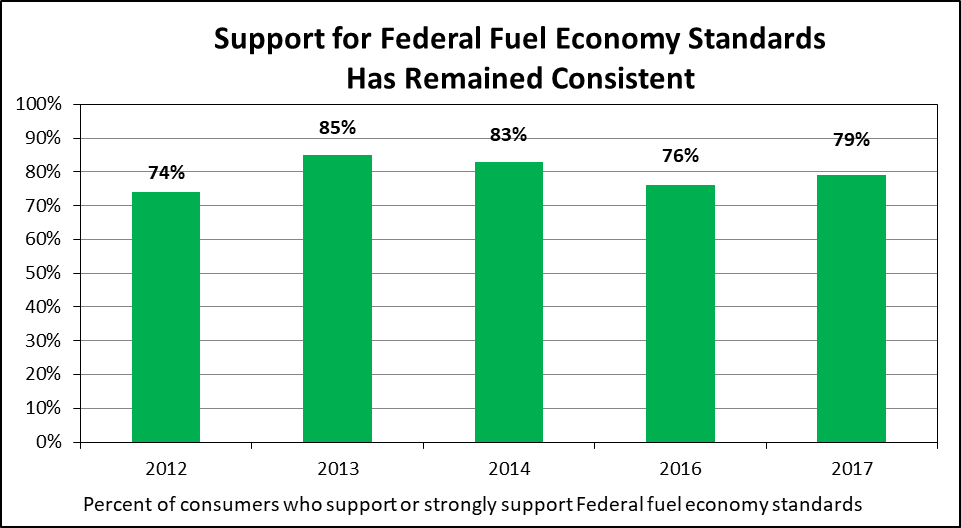Washington D.C. — Recent media reports indicate that the Trump Administration is looking at a variety of options to roll back the current economy standard. “Not only are the standards, agreed to by the automakers, imminently achievable, but rolling them back would take a big bite out of household budgets,” said Jack Gillis, CFA’s Director of Public Affairs and author of The Car Book. In fact, numerous surveys by the Consumer Federation of America (CFA) have shown that Americans support federal fuel economy standards for cars and light duty trucks by a large margin. In our most recent survey (July, 2017), almost 80 percent of Americans, including 68 percent who are Republican, support the standards.1

Since 2012, consumer support for fuel economy standards has remained very consistent, averaging 79%.2 “One reason for the consistent and widespread support of higher standards is that a large majority of car buyers believe that a vehicle’s fuel economy is important in their everyday lives,” said Jack Gillis. In part, this concern reflects the belief that gas prices will rise in the future, as evidenced by the most recent price increase. When asked (July, 2017) to predict the price of gasoline in five years, the average price given by survey respondents was $3.90. Today’s average price is $2.58, which is $0.30 more than this time last year.3
“Our analysis clearly indicates that the car companies are fully capable of meeting the CAFE standards and can do so with great savings for consumers,” said Gillis. “Rolling back the standards at this point would not only hurt America’s already financially beleaguered consumers, but would hamper vehicle sales and put U.S. car companies at a distinct competitive disadvantage to the Asian car companies who will meet the standards.” Numerous cost-benefit analyses show that these standards can save consumers thousands of dollars over the life of the vehicle in reduced gas costs, even at today’s lower prices. In a recent report, CFA calculated that rolling back fuel economy standards, would lose one-half trillion dollars in pocketbook savings on transportation costs, considering both household gasoline and the cost of diesel used in trucking goods, (which is passed through to consumers).
Staying the course with achievable fuel economy standards not only puts money back into consumer pocketbooks but it ensures that U.S. car companies stay competitive. We’ve bailed the car companies out once, when they were saddled with millions of unsold, inefficient vehicles. We don’t want to have to do that again. These standards protect consumers against volatile gas prices and are fair – increasing the fuel economy of all vehicles, respecting both consumer choice and the choice of automakers to buy or build whatever type of vehicle they want,” said Gillis.
Contact: Jack Gillis, 202-737-0766
1 The survey was conducted for CFA by ORC International, which interviewed a representative sample of 1,008 American adults by landline or phone. The margin of error for the survey is plus or minus three percentage points.
2 The surveys were conducted in: March 2012, April 2013, May 2014, December 2016, and July 2017. The surveys were conducted for CFA by ORC International, which interviewed a representative sample of American adults by landline or phone. The margin of error for each survey is plus or minus three percentage points.
3 According to AAA.

